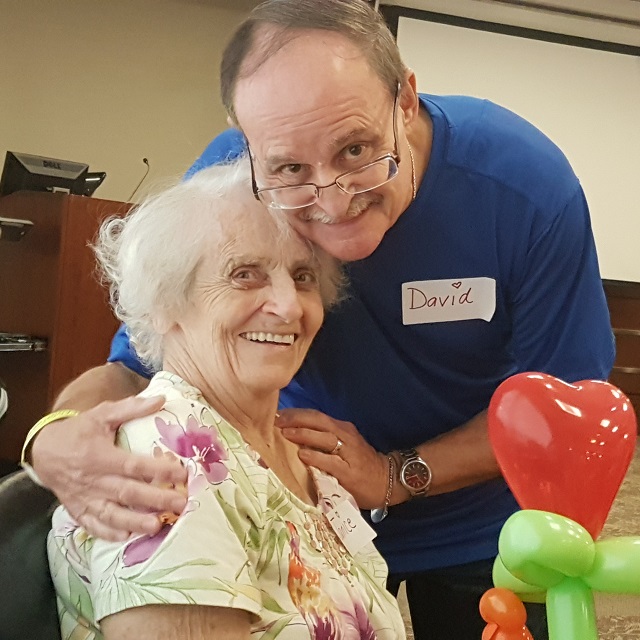Helping Caregivers to Feel Empowered and Encouraged

Janice Felzenberg with her husband and caregiver, David.
The day-to-day responsibilities of caring for his wife after her Alzheimer’s diagnosis were beginning to take a toll on David Felzenberg, but thankfully, Johns Hopkins Bayview’s Called to Care program was there to support him.
Called to Care prepares and supports people caring for loved ones who have health-related needs or limitations. The program, which initially received funding from the Harry and Jeannette Weinberg Foundation, offers supportive services, education, and links to community organizations and agencies.
“It’s a valuable resource in the community,” says Felzenberg. “They helped me find resources and they’re all good, compassionate people. We learn how to plan for the future.”
According to the AARP and the National Alliance for Caregiving, nearly 66 million Americans serve as informal caregivers. Felzenberg became an around-the-clock caregiver when his wife, Janice, was diagnosed with Alzheimer’s disease.
“As a caregiver, you have to think for two people,” he says. “Even in the best of circumstances, it wears you down. Called to Care teaches you how to build cooperative relationships and work with your healthcare professionals as a team.”
Johns Hopkins Bayview caregiver project manager Linda Stewart says equipping the caregiver with resources and support is the backbone of Called to Care.
“We want caregivers to feel empowered and encouraged,” Stewart says. “They are helping with the healing and care of their loved ones, and they’re as much a part of the team as their health care professionals. This is a very important role they’re playing.”
Stewart says taking care of a loved one with a long-term health condition can be an intense experience. Called to Care is there to help throughout the caregiving journey.
“We do group activities where caregivers can share their challenges and their joys,” she says. “There are also opportunities to connect with more than 30 health and human services nonprofits — from Meals on Wheels of Central Maryland to Pro-Bono Counseling.”
Alan Skiles, a patient education nurse at Johns Hopkins Bayview Medical Center, is employed with one of the first units to pilot the program. He says caregivers “don’t know what they need until they need it.”
“They are overwhelmed and often stressed or fatigued with the demands of what they do,” Skiles says. “It’s particularly helpful to have this link when caregivers need resources and don’t know where to turn. Sometimes it’s good just to have someone to talk to who supports you.”
Felzenberg says Called to Care has also provided him with a sense of community.
“It’s nice to be with others who are going through similar experiences — you’re speaking the same language. You can relate even if your loved one may not be in the same stage,” he says. “We try to support each other and come up with helpful alternatives. We talk through situations, and if someone’s gone through something similar, they can offer suggestions.”
Caregiver Dee Fowlkes has had a similar experience in the Called to Care program. When her father Otis was diagnosed with dementia, she went on a search to find out what it was and how to deal with it.
“It was a disease I knew nothing about,” Fowlkes says. “After my first Called to Care session, I was convinced I was in the right place to learn what was going on with my dad and also what to do with myself. They opened a whole new world for me!”
Fowlkes says the group helps her feel like she’s not alone.
“You don’t have to explain what you’re going through because they’re going through the same thing,” she says. “You don’t have to wear yourself out explaining it.”
Through Called to Care, Fowlkes says she has learned it’s important to take care of herself, too.
“Just setting some time for yourself is important,” she says. “I learned it’s OK to say no, and I learned that it’s OK to ask for help. People can help in different ways, but you have to learn to ask.”
Fowlkes says Called to Care is a one-stop shop.
“You’ll get resources that you would have never known existed and amazing support,” she says. “They give you confirmation that you made the right choice to be a caregiver, that you’re not alone and you know they’re here to help.”
Called to Care is hosting a free program called The Joy of Caregiving on Thursday, Nov. 14. The celebration for family caregivers begins at noon in the Johns Hopkins Bayview Asthma and Allergy Center. While it is free, attendees are asked to RSVP to 410-550-8018.
Interested in Called to Care? Call 410-550-8018 or visit hopkinsmedicine.org/jhbmc/c2c for more information.